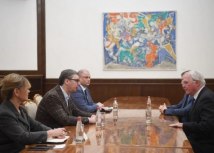Syria - a new Rwanda?
Syria is both human catastrophe and political stalemate. Until governments do what they should, it needs more humanitarian relief
Timothy Garton AshSome 18 million British children, women and men have fled their homes as a result of the civil war that has torn Britain apart over the last two years. About 280,000 people have been killed, and many more wounded. That, proportionately translated to the UK, is the scale of the Syrian tragedy. And there is no end in sight.
Some 6000 refugees pour out of Syria every day, straining international humanitarian aid resources and destabilising the country’s neighbours. Syrian refugees already make up 10 per cent of the population of Jordan. That’s like the whole of Bulgaria moving to Britain.
Antonio Guterres, the UN high commissioner for refugees, says the displacement of people has not risen ‘at such a frightening rate’ since the Rwandan genocide of 1994. The absolute size of the humanitarian catastrophe may not yet match the largest of recent times, such as the 2010 floods in Pakistan, but Syria is working hard to catch up.
Moreover, its political knock-on effects are potentially far greater than those of any mere tsunami, drought or earthquake. Syria’s civil and proxy war has set the old Sunni-Shia wound bleeding again in the whole neighbourhood. Iran, Hezbollah and Iraqi Shiites support the forces of president Bashar al-Assad against internal and external Sunni foes. Blood flows more freely than water across the arbitrary, post-colonial frontiers of the region. Beside the external Islamic patron states, including Saudi Arabia and Turkey on the Sunni side, there is Russia arming al-Assad’s forces against rebels who are being (very tentatively) supported by the US - almost as if we were back in the Cold War.
Syria also fits into a larger picture, with the UNHCR recording an 18-year high of more than 45 million forcibly displaced people worldwide at the end of 2012. The current rate of displacement is about one person every 4 seconds. Give the wider Middle East another year or two, and the world will have a whole England of the uprooted. (England’s population is around 56 million.)
‘Something must be done!’ we cry, as we pack our suitcases for the summer holidays. But what? Make the decisive, massive military intervention that alone would defeat Assad, and you face another Iraq. Don’t intervene, and accept another Bosnia. The record of Western military intervention in this region is disastrous. Yet the notion that not intervening in any way, militarily or otherwise, is always the most moral option simply does not stand honest scrutiny.
Syria demands that we think again about the relationship between politics and humanitarian action. Earlier this month, a former British foreign secretary, David Miliband, reflected on this in his last major public speech before leaving his first life, as a politician in London, to begin his second life, as the leader of a humanitarian organisation - the International Rescue Committee - in New York.
On the one hand, the morality of what he will do as a humanitarian is far simpler than that of what he did, or might still be doing, as a politician. Deploying tents to shelter people in desperate need is more obviously, unambiguously good than deploying half-truths to win votes. In that sense, David might exclaim ‘it is a far, far better thing that I do, than I have ever done’. On the other hand, it could also be a far less effective thing than what his brother Ed may yet have a chance to do as Britain’s prime minister.
For the nature of humanitarian relief in man-made disasters is that you are treating the symptoms and not the causes. Were politicians effectively to address the political causes of Syria’s disaster, that would be more valuable than everything that all the humanitarian organisations in the world can do. If the US, Europe and Russia really got together and said ‘we’re going to de-escalate this conflict, through stopping all the arms supplies we have any influence on, followed by a negotiation involving all the relevant internal parties and external powers, including Iran under its new president,’ they might get somewhere. But it’s simply not happening, nor likely to happen any time soon.
British prime minister David Cameron recently described the situation inside the country as a ‘stalemate’, with Assad’s military position somewhat strengthened and growing sectarian extremism on the opposition side. Pressed for a no-fly zone by angry Syrian refugees in the Zaatari refugee camp, a tent settlement so densely populated it is said to be Jordan’s fourth largest city, US secretary of state John Kerry explained to them that ‘a lot of different options are under consideration’. Translation: Washington sees no good ones.
That’s no excuse for abandoning the politics. But given that they are blocked, humanitarian relief becomes even more vital. Until the surgeons finally tackle the causes of the disease, we have to keep changing the bandages, alleviating the pain and feeding the patient. But this, too, is not happening enough. Governments have only met one-third of the UN’s funding targets for humanitarian assistance for Syria. That puts even more strain on non-governmental humanitarian organisations, yet Oxfam says people have so far donated just one third of its £30 million Syria target. Four months into a six-month campaign for Syria, the UK-based Disasters Emergency Committee, a seasoned coalition of charities, has only raised £17 million. By contrast, its six-month campaign for victims of the Asian tsunami raised a total of £392 million, and that for the Haiti earthquake, £107 million.
It seems that visually shocking natural disasters, where people are seen to be innocent victims of what insurers call ‘acts of God’, get us giving far more generously than political conflicts do. The Disasters Emergency Committee’s 2009 campaign for Gaza raised just over £8 million, its 2008 one for the Democratic Republic of Congo, £10.5 million. This is perhaps understandable, but not rational. Why should what innocent people suffer as a result of ‘acts of God’ be considered worse than what innocent people suffer as a result of their compatriots fighting each other in the name of God?
As a columnist on international affairs, I get tired of telling governments they ‘must’ do something, knowing perfectly well that nine times out of ten they won’t. This time I have a simpler conclusion. Before we go away on holiday, we should all make a donation to humanitarian relief for Syria. That’s what I shall do when I’ve clicked the ‘send’ button for this column.
timothygartonash.com
Timothy Garton Ash is Professor of European Studies at Oxford University, where he directs www.freespeechdebate.com, and a Senior Fellow at the Hoover Institution, Stanford University. He is the author, most recently, of Facts are Subversive: Political Writing from a Decade Without a Name



